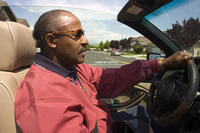Driving & Transportation

 Stroke can hurt parts of the brain that help someone drive safely. This may include the ability to think, see and move. With practice, most survivors can learn to drive again. Others will never be able to return to driving.
Stroke can hurt parts of the brain that help someone drive safely. This may include the ability to think, see and move. With practice, most survivors can learn to drive again. Others will never be able to return to driving.
Why Is It Important?
Driving allows people to be independent. People often feel driving gives them control. If your loved one cannot drive, talk about what this means. Be sensitive to their feelings. If your loved one can drive, look for ways to ensure safe driving.
How Do You Make Sure Your Loved One Can Drive Safely?
Talk with your healthcare team. Find out if health problems may be affecting driving skills. Some problems have solutions. Your healthcare team should do a complete medical check-up. They should also review the medicines your loved one is taking.
Check if your local VA center has driver evaluation services. Often rehabilitation centers can evaluate driving skills.
Contact your local Department of Motor Vehicles (DMV). Ask if the DMV has tests to check driver safety.
What Are Some Signs of Unsafe Driving?
- Running red lights and stopping at green lights
- Pushing the wrong pedal or moving into another lane by mistake
- Getting lost in places your loved one has been before
- Hitting cars or other objects
- Becoming angry or confused in traffic
See the Resources section for more links to other unsafe driving signs. Talk to your healthcare team about your concerns.
What Can You Do to Help Your Loved One Drive Safely?
- Limit driving to daytime hours and on familiar roads.
- Find out about local training programs to improve driving. The AARP and other organizations may offer classes. The "Resources" section has contact information for the AARP.
- Ask your loved one to carry an aphasia card if they have speech problems. The card will explain why your loved one cannot answer questions. Include your contact information on the card. The RESCUE team has a printable aphasia card for you to download.
- Make sure your loved one knows the warning signs of another stroke. Talk about what to do if these signs appear while driving. Your loved one should pull off the road immediately and call 9-1-1.
What Can You Do if Your Loved One Can’t Drive?
Make a list of places they need to go. Some activities may be healthcare visits, shopping and social events. Think of the best way to get your loved one to those places. Here are some suggestions:
- Talk to a VA social worker about transportation to VA clinics.
- Consider taxis and public transportation. Ask family, friends and neighbors to take your loved one on errands and to medical appointments.
- Each city or town will have different transportation services. For example, some not-for-profit organizations offer volunteer drivers. Contact your local Area Agency on Aging. Go to the Resources section for the contact information.
- Some tasks can be done on-line, by mail or over the phone. Find out about home delivery services. This can include groceries, shopping and prescription refills. Make sure you know and trust the store you use.
- See if your area has a Meals-on-Wheels service that delivers food to the home. The Resources section at the end of this fact sheet has contact information for Meals-on-Wheels.
How Do You Pay for Transportation?
Some transportation services may be free. Others may charge a fee. Ask your VA social worker for help finding services. Independent living centers and disability offices may offer services. Your local Area Agency on Aging is another place to look. Ask about travel vouchers that cover the cost of transportation. There may also be training programs to help your survivor use the services safely.
Remember
- Talk to your healthcare team about your loved one’s driving skills. They can determine if health problems will affect driving.
- Watch for signs of unsafe driving. Ask about training programs to help your loved one drive better. If needed, a VA social worker can suggest transportation services.
- Be sensitive to your loved one’s feelings about driving. If your loved one is unable to drive, they may feel less independent.
More Resources 
Additional credible resources on this topic can be found here. Website pages may change or update, therefore if a link does not work, you may also try to type the information into your internet search bar. This Resource List will be updated frequently.
|
*Link Disclaimer: Links to information and Web sites outside of the Department of Veterans Affairs do not indicate an endorsement of products or services offered by the sites. In addition, these sites may have privacy and security policies that are inconsistent with those of VA. |
References: Cleveland Clinic. (2008). Caregiving: Adult transportation. Retrieved September 29, 2008, from: http://my.clevelandclinic.org/disorders/stroke/hic_caregiving_adult_transportation.aspx*; National Highway Traffic Safety Administration. (2004). Driving when you have had a stroke. Retrieved September 29, 2008, from: http://www.nhtsa.dot.gov*; American Stroke Association. (2008). What are some warning signs of unsafe driving? Retrieved September 29, 2008, from: http://www.strokeassociation.org/presenter.jhtml?identifier=3005465#signs*; AGS Foundation for Health in Aging. (2008). The patient education forum: Safe driving for seniors. Retrieved September 29, 2008, from: http://www.healthinaging.org/public_education/pef/safe_driving_for_seniors.php*; American Stroke Association (2008). How can I tell if I can drive? Retrieved September 29, 2008, from: http://www.strokeassociation.org/presenter.jhtml?identifier=3005465*; American Medical Association. (2003). Physician’s guide to assessing and counseling older drivers. Retrieved September 29, 2008, from: http://www.ama-assn.org/ama/pub/physician-resources/public-health/promoting-healthy-lifestyles/geriatric-health/older-driver-safety/assessing-counseling-older-drivers.shtml*; Administration on Aging. (2008). Transportation options for older adults. Retrieved September 29, 2008, from: http://www.eldercare.gov*; The Stroke Association. (2006). Driving after Stroke. Retrieved January 28, 2009 from: http://www.stroke.org.uk/information/our_publications/factsheets/02_driving_after.html*.
These materials were created for the project:
Web-Based Informational Materials for Caregivers of Veterans Post-Stroke
Project Number SDP 06-327 funded by VA HSR&D Quality Enhancement Research Initiative (QUERI)



















